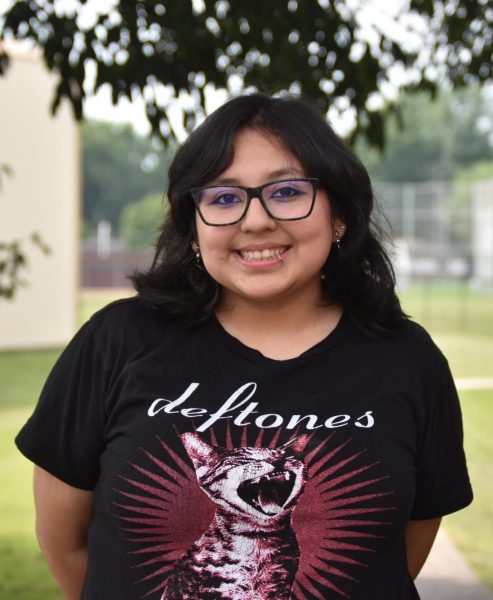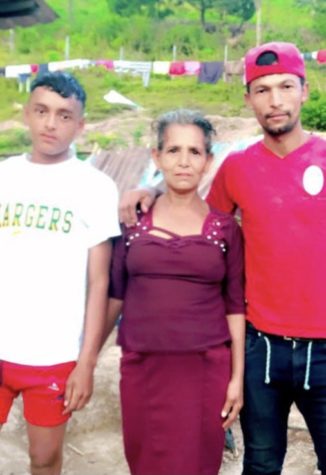
Hi! It’s Salem, and for the third and last time in a row, I am writing another staff bio. I’m a senior now, which is really hard to believe. I am this...
Honduras student goes through lengths to support his family
March 17, 2023
Freshman Ronal Edelsi Herrera remembers Christmas back in Honduras when he was 7-years-old, and his family and friends would get together and celebrate.
He remembers the big family reunion and the amount of food that was enough for his whole family to eat. Back then, the holiday meant much more to him as he was surrounded by family.
Herrera, who is one of nine siblings, crossed the border four years ago to come to the U.S. and find a better life for his family and himself. His father had died before he could really know him, so his mom would work hard for him and his siblings.
This was the case until he decided he wanted to come to America, leaving his mom unsure of the decisions. He was persistent, and sat his mom down to tell her his plan: to continue studying and working hard.
In Honduras, he began working at a bean farm with his family at the age of 6 doing small jobs and spending his days at work.
He was enrolled at a school, but he’d be at work on the farm more. There, he would meet a worker who saw his potential and would bring him over to the U.S and pay to go and help Herrera get there.
“My family didn’t want me to come,” Herrera said through a Spanish translator, “but I decided to because I wanted a better future for my life and be able to help [my family].”
The journey from Honduras wasn’t the easiest. He had to worry about the obstacles in the way, such as crossing a river in a raft near the border and getting through immigration police, but immigration did not notice him.
Herrera doesn’t remember much about leaving Honduras, but he does remember that he left at night.
Once getting to the U.S, he went straight to Indiana on a bus. When he first got here, he was hopping from house to house, staying with
people he knew.
After, he started living with the family friend he met at work. A week after his arrival, he was enrolled at Southport Elementary.
To Herrera, life in America is not the same as Honduras. Back home, he mentioned that he was able to go out with his friends more and visit family, but he’s not able to do that in America.
Noticing how many things differ, such as food and style, he focuses on studying instead of working, but he wants to look for a job once he’s old enough. One thing he keeps his focus on is the English language.
“I study here at school, I’m learning more English and I keep going,” Herrera said.
He began learning English and is working on becoming better at it despite the difficulties. Currently, he’s in a class with English and speech teacher Erin Ancelet.
Ancelet met Herrera in her English class. She teaches three EL classes, so Herrera was not the first kid she’s met with a hard past. At first, it was small talk between them with the occasional push to help.
During the WIDA tests, Herrera and a friend came in during her prep period. While conversing with another student, Herrera talked about coming from Honduras. Ancelet didn’t want to push, but she was curious to know more about his story.
“It was just kind of shocking to hear that a lot of students come to ninth grade without having ever really been to a school or even a school like this before,” Ancelet said.
Herrera doesn’t favor a subject in school, but he doesn’t put limitations on what he is willing to learn here either. He’s a talkative student and is a bit of a class clown. He’s now able to help other students who don’t speak any English.
However, his difficulties do not stop him from his dream of becoming a police officer to help serve and protect.
He plans to work and go to a police academy after high school. If the chance to go to college comes around, Herrera plans to take that opportunity as well.
“I’d like to learn something new because learning something different can help you in the future,” Herrera said.

He still tries to do things for his family despite being busy with school. Every once in a while when he receives money, he sends csome of it back home. One of the people he lives with at home here
has a card that makes it easy to deposit.
But it can be hard to contact his family because they do not have a phone. Herrera is not able to talk to them often, so when they talk, his family has to borrow a phone from someone else.
He mentions that phone calls can be happy, but there’s always a melancholic feeling to it. Conversations usually revolve around how he’s doing in school and how his family and their lives are back in Honduras.
Despite the hardships, Herrera tries to do his best to make his family proud. He misses his family, especially his nephews due to not being able to see them grow up. His family taught him how to work and how to fight for his dreams.
Working at the bean farm in Honduras showed him the reality of hard work. His mom would encourage him to go far, whether it’s in school or anything else. And he follows her word. He hopes that maybe his hard work would let him return to Honduras or bring his family to America.
“My motivation to be here is because I want a better future for my life,” Herrera said. “I want to stay ahead, and have money to help my family.”
Estudiante de primer año, Ronal Edelsi Munguia Herrera se acuerda de la Navidad en Honduras cuando tenía 7 años, cuando su familia y sus amigos se reunían para celebrar. Se acuerda de la gran reunión de su familia y la cantidad de comida que había para qué todos pudieran comer. En aquel momento, la Navidad era más importante cuando estaba con su familia.
Herrera, uno de nueve hermanos, cruzó la frontera hace cuatro años para venir a los Estados Unidos en busca de una vida mejor para su familia y para él mismo. Su padre había muerto antes de que pudiera conocerlo realmente, por lo que su madre trabajó más duro para él y sus hermanos. Este fue el caso hasta que decidió que quería venir a los Estados Unidos, dejando a su madre insegura de su decisión. Fue persistente y sentó a su mamá para contarle su plan: seguir estudiando y trabajando duro.
En Honduras, comenzó a trabajar en una granja de frijol con su familia a la edad de 6 años haciendo pequeños trabajos y pasaba sus días en el trabajo. Estaba inscrito en una escuela, pero trabajaría más en la granja. Allí conocería a un trabajador que vio su potencial y lo traería a los EE. UU. y pagaría para ir y ayudar a Herrera llegar allí.
“Mi familia no quería que viniera”, dijo Herrera, “pero decidí hacerlo porque quería un mejor futuro para mi vida y poder ayudar [a mi familia]”.
El viaje desde Honduras no fue fácil. Tenía que preocuparse por los obstáculos en el camino, como cruzar un río en una balsa cerca de la frontera y pasar por la policía de inmigración, pero inmigración no lo notó. Herrera no se acuerda mucho del viaje, pero lo que sí se acuerda es que se fue en la noche.
Una vez que llegó a los EE. UU., se fue directamente a Indiana en un autobús. Cuando llegó aquí, saltaba de casa en casa, quedándose con gente que conocía. Después, comenzó a vivir con la familia del trabajador que conoció en el trabajo. Una semana después de su llegada, se matriculó en la escuela primaria Southport.
Para Herrera, la vida en América no es igual que en Honduras. En Honduras, mencionó que podía salir más con sus amigos y visitar a la familia, pero no puede hacerlo aquí. Al darse cuenta de cuántas cosas difieren, como la comida y el estilo, se enfoca en estudiar en lugar de trabajar, pero quiere buscar trabajo una vez que tenga la edad suficiente. Una cosa en la que mantener su enfoque es el idioma inglés.
“I study here at school, I’m learning more English and I keep going,” Herrera said.

Comenzó a aprender inglés y está trabajando para mejorarlo a pesar de las dificultades. Actualmente, está en clase con la profesora de inglés y oratoria Erin Ancelet.
Ancelet conoció a Herrera en su clase de inglés. Ella enseña tres clases de inglés, por lo que Herrera no fue el primer niño que conoció con un pasado difícil. Al principio, era una pequeña charla entre ellos con el empujón ocasional para ayudar.
Durante los exámenes de WIDA, Herrera y una amiga llegaron durante su período de preparación. Mientras conversaba con otro estudiante, Herrera habló sobre venir de Honduras. Ancelet no quería presionar, per tenía curiosidad por saber más sobre su historia.
“Fue un poco impactante escuchar que muchos estudiantes llegan al noveno grado sin haber estado realmente en una escuela o incluso en una escuela como esta antes”, dijo Ancelet.
Herrera no favorece una materia en la escuela, pero no pone límites a lo que está dispuesto a aprender aquí. Es un estudiante hablador y un poco payaso de clase. Ahora puede ayudar a otros estudiantes que no hablan inglés. Sin embargo, sus dificultades no le impiden cumplir su sueño de convertirse en policía para ayudar a servir y proteger.
Planea trabajar e ir a una academia de policía después de la secundaria. Si surge la oportunidad de ir a la universidad, Herrera planea aprovechar esa oportunidad también.
“Me gustaría aprender algo nuevo porque aprender algo diferente puede ayudarte en el futuro”, dijo Herrera.
Todavía trata de hacer cosas por su familia a pesar de estar ocupado con la escuela. De vez en cuando, cuando recibe dinero, envía una parte a casa. Una de las personas con las que vive aquí en su casa tiene una tarjeta que facilita el depósito.
Pero puede ser difícil comunicarse con su familia porque no tienen teléfono. Herrera no puede hablar con ellos a menudo, por lo que cuando llaman, su familia tiene que pedir prestado un teléfono a otra persona. Menciona que las llamadas telefónicas pueden ser felices, pero siempre hay un sentimiento melancólico. Las conversaciones generalmente giran en torno a cómo le va en la escuela y cómo su familia y sus vidas están de vuelta en Honduras.
A pesar de las dificultades, Herrera hace todo lo posible para enorgullecer a su familia. Extraña a su familia, especialmente a sus sobrinos por no poder verlos crecer. Su familia le enseñó a trabajar ya luchar por sus sueños. Trabajar en la granja de frijoles en Honduras le mostró la realidad del trabajo duro. Su mamá lo alentaría a llegar lejos, ya sea en la escuela o en cualquier otra cosa. Y él sigue su palabra. Él espera que tal vez su arduo trabajo le permita regresar a Honduras, o tal vez incluso traer a su familia aquí.
“Mi motivación para estar aquí es porque quiero un mejor futuro para mi vida”, dijo Herrera, “y quiero seguir adelante y tener dinero para ayudar a mi familia”.

Hi! It’s Salem, and for the third and last time in a row, I am writing another staff bio. I’m a senior now, which is really hard to believe. I am this...